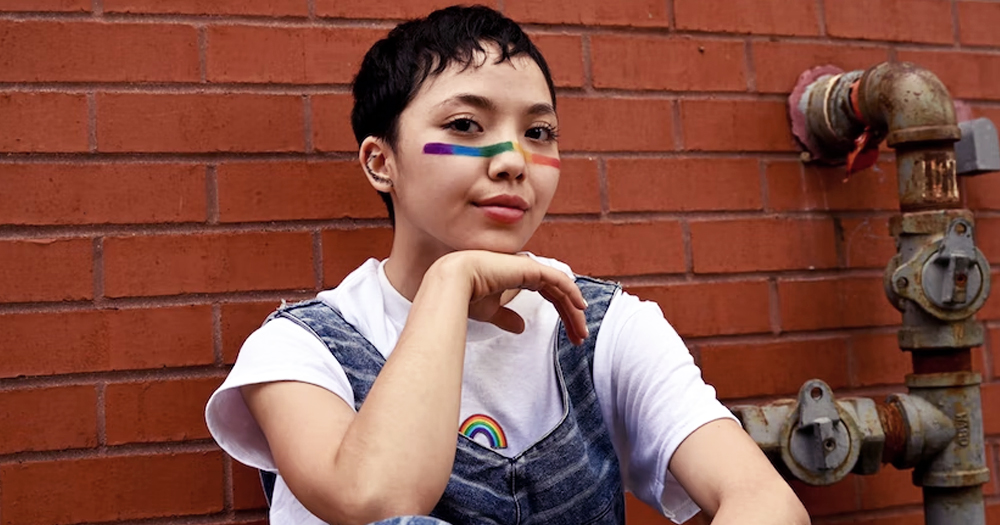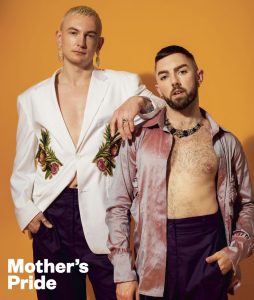Lesbianism has an intricate and mixed history, particularly when it comes to gender identity and presentation. Many modern views on lesbianism, however, appear to be attempting to erase this. Whether done consciously or unconsciously as a means of defence, current views on the community are becoming far too simplistic and stagnant and risk erasing some identities, like those of non-binary lesbians.
A resurgence in bio-essentialist thinking has seriously begun hindering community building by attempting to block out Trans feminine, as well as Trans masculine, people from identifying with lesbianism- something that actively goes against a rich history of gender fluidity within the community. Ireland as an island is caught between the growing TERF rhetoric in the UK and anti ‘gender ideology’ beliefs in the US. As a result of this, we need to be having our own conversations surrounding what we want our communities to look like and be mindful of not getting wrapped up in transphobic talking points.
Human beings are extremely complex and as result, their identities are equally complex. We are living in a time where our understandings of gender and sexuality are evolving rapidly, to the point where it can even be hard for all queer people to keep up with it. To maintain a supportive and thriving community, lesbianism must embrace its own complications and contradictions.
TERFism is inherently rooted in anti-LGBTQ+, normative and alt-right ideology. It has taken root in certain ‘LGB movements’ by convincing some members of our community that it is better to punch down at the oppressed rather than fight upwards and build an interconnected community. This mode of thinking is at odds with the values that lesbianism has always upheld and should still be upholding. Lesbianism at its core should not be palatable to a cis-gendered heteronormative viewpoint which is ultimately what these anti-Trans groups are trying to achieve.
As a pair of non-binary lesbians, we decided to focus on this community building via research and education. After speaking to different non-binary lesbians from around the world, we put together a presentation for the Lesbian Lives Conference at UCC which focused on expanding lesbianism with identity based on inclusion.
TERFism thrives solely on exclusion, so without excluding others, or dictating how they should live, TERFism cannot survive. Similarly, without community building, mutual understanding, and radical inclusion, lesbianism, and queerness as a whole, cannot survive. We believe that lesbian history can be honoured and accepted, but simultaneously its future can change. Evolution does not equal erasure and as Trans non-binary lesbians, we refuse to see our community collapse.
We want to share some of our findings in order to give people an insight into what makes up contemporary lesbianism and to encourage people to expand their ideas of what its future could look like. Below are some of the responses we received when discussing various aspects of the lesbian and non-binary experiences with members of the community.
ON COMMUNITY
“Lesbians are primarily concerned with creating community or loving or connecting with, or probably all three, with women and people who are not men and also people invested in creating that community, love and connection.”
“I would hope the same lesbians who feel the need to lament the loss of butches or whatever people who transition, or people who end up being something else… they would consider that their community is already bigger than they know… rather than pressure people into claiming an identity that doesn’t end up being true to them, that they would examine the diversity that there already is within the lesbian community.”
“My experience with the lesbian community is that it can be very unforgiving, and it can also be harmful for queer people. There is no experimenting in lesbianism.”
“What if one day everyone uses the word queer and no one uses the word ‘lesbian’… There was a time before everyone used the word ‘lesbian’. We’ve always been here, we always will be here, the language will change. I hope the sense of community doesn’t [change].”
ON INCLUSION
“I always think back to this thread on Twitter where someone was saying lesbianism was reductive and excluded so many people or whatever and someone responded saying, ‘If you think lesbianism is reductive then you are not a lesbian because realising I am has been the most expansive experience of my life’. You don’t need to include men for things to be expansive and beautiful.”
“I can… identify as a lesbian, but I can also acknowledge I like gay men, and if I find a gay man who wants to date me, who also feels like a lesbian but is a gay man, we’re going to be much better fitted and connected than I would with a lesbian who is cis and exists in the binary.”
“Every lesbian I’ve met is different, and identifies completely differently, and has a different gender.”
ON EXCLUSION
“The idea of a ‘Gold Star’ lesbian, there is so much misogyny in the lesbian community… the problem with lesbianism is that it’s full of white women who are problematic white feminists, who are not looking to create community, they are looking to isolate, looking to u-haul, looking to gate-keep, they’re looking to keep the lesbian community niche.”
“I feel like cis lesbians in my experience, this is a generalisation, but they kind of just think I’m a woman. They’re like ‘okay you’re Trans or whatever but you’re just a lesbian, you look like a boy.’”
“The way white feminism and western culture and lesbianism interact keeps lesbians isolated and in the shadows, and keeps us from gaining community and trust with each other cause there’s so many fucking rules.”
“I would never want to denigrate lesbians as a group but there are a lot of close-minded people.”
ON TRANSNESS
“The way that I experience and understand lesbianism is absolutely informed by the ways in which I am Trans, the way that I am non-binary and vice versa.”
“Gender doesn’t really make any sense to me so I don’t see any other option than being Trans. It doesn’t make sense to me that you’re born and people are like ‘okay you’re a girl you do this, you’re a boy you do that’- that never made any sense to me. And I also think as I’ve explored my sexuality it doesn’t make sense to me and also be cis and a lesbian. Those things aren’t compatible to me.”
“I know so many non-binary lesbians who physically transition in the sense that they take T and get top surgery and there’s such a massive overlap between people who will just call themselves Trans but in all aspects be a non-binary lesbian. The terms kind of just blur. I don’t think you can really make strict distinctions.”
ON HISTORY AND EXPERIENCE
“Lesbianism does and has always troubled traditional concepts of gender, and that’s part of what I think is cool about lesbians.”
“I’ve been in relationships with cis femme lesbians that have been invested in womanhood in a way that I just don’t relate to, being a lesbian isn’t related to womanhood like that for me.”
“Most people think non-binary lesbians can’t exist though I find if you have that conversation people generally get it and you can move on. I think that liberation…it goes back into the history of homophobia and transphobia. Even today being non-binary is frowned upon and misunderstood and similarly with being a lesbian. They have a history behind them of being these two identities that people bring so much shame upon and they have that connection together. Non-binary lesbians have always been around but whenever they try and say ‘hey we’re here’ they’ve been immediately shut down.”
“I think all lesbians have a complicated relationship to womanhood if they identify as one because the construct of womanhood is so centred on being the opposition to men and also attracted to men so by being a woman who loves women you are not a true woman because you are not defined around men.”
It’s clear from these statements that many non-binary and Trans lesbians have a strong attachment to the lesbian label but also a much broader idea than some people of what that label means. While this can be perceived as dismissive to the strict WLW view of lesbianism, it needs to be kept in mind that the notion that there exists one coherent definition for queer identities is a myth.
These words are useful as signifiers but they contain different meanings to each person that uses them, coming at identity from this place of inclusion is complex but it is possible. If we recognise that the gender binary is a false narrative that only exists in order to oppress and control, we must also recognise the impact that this has on sexual identities that are based around those ideas of gender.
Without welcoming varieties, lesbian communities risk extinction, if they are going to survive they must also be queer in the sense that they move away from cis-hetero normative ideologies, particularly those brought through TERFism and general transphobia. In the words of Levi Hord, “Lesbian specifically stands to be liberated and strengthened when removed from the binary systems.”
This article is featured in the June 2022 issue of GCN 372.
© 2022 GCN (Gay Community News). All rights reserved.
This article was published in the print edition Issue No. 372 (June 10, 2022). Click here to read it now.
Support GCN
GCN is a free, vital resource for Ireland’s LGBTQ+ community since 1988.
GCN is a trading name of National LGBT Federation CLG, a registered charity - Charity Number: 20034580.
GCN relies on the generous support of the community and allies to sustain the crucial work that we do. Producing GCN is costly, and, in an industry which has been hugely impacted by rising costs, we need your support to help sustain and grow this vital resource.
Supporting GCN for as little as €1.99 per month will help us continue our work as Ireland’s free, independent LGBTQ+ media.

